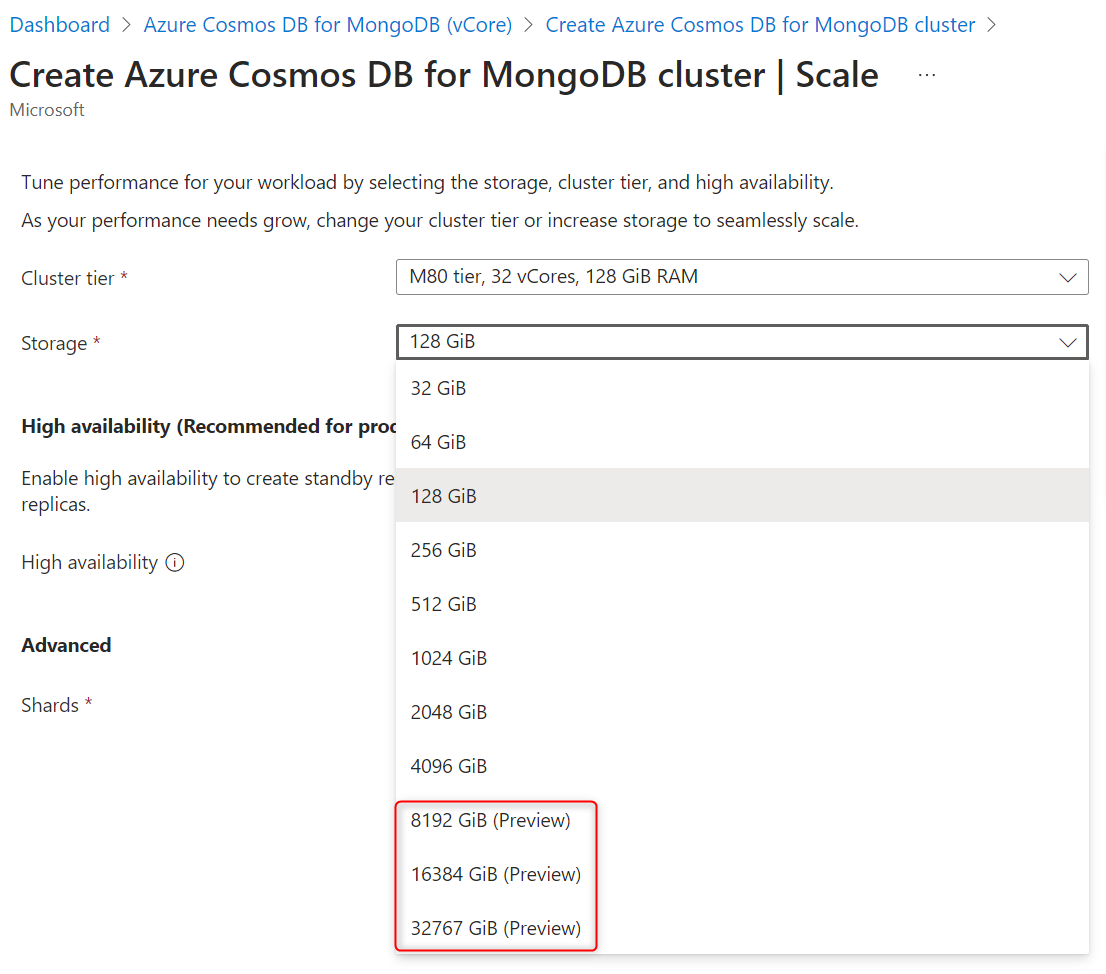We’re thrilled to announce the preview of new storage sizes for vCore-based Azure Cosmos DB for MongoDB, designed to provide more capacity and enhanced performance for your MongoDB workloads. Whether you’re managing large, complex datasets or high-throughput applications, these new storage tiers—8 TiB, 16 TiB, and 32 TiB per physical shard—offer the flexibility to scale effortlessly and optimize your MongoDB database operations.
Expanded storage options: 8 TiB, 16 TiB, and 32 TiB per physical shard
vCore-based Azure Cosmos DB for MongoDB now offers larger storage capacities per physical shard, with new tiers of 8 TiB, 16 TiB, and 32 TiB, a significant jump from the typical industry standard of 4 TiB for MongoDB databases. These expanded sizes mean you can now store much larger datasets on a single shard, simplifying database management and reducing the need for complex sharding configurations in many cases.
Figure 1. Screenshot from the Azure portal of an extended selection of the storage sizes for a vCore-based Azure Cosmos DB for MongoDB cluster.
Performance boost: Up to 20,000 IOPS with 32 TiB Storage
The new 32 TiB storage tier isn’t just about capacity—it’s also designed for high performance, supporting up to 20,000 IOPS per physical shard. This increase in throughput allows you to handle high-traffic, I/O-intensive workloads with ease, delivering low-latency, high-performance operations, even for your most demanding applications.
Storage beyond the industry standard
Compared to the standard 4 TiB per shard commonly seen in other cloud providers, the 32 TiB option in Azure Cosmos DB represents a significant leap forward in available storage per shard. This expanded capacity is ideal for MongoDB customers with massive workloads, such as real-time analytics, large-scale transactional systems, or high-volume e-commerce platforms.
Handling 100s of terabytes with multishard capabilities
When combined with the multishard capabilities of vCore-based Azure Cosmos DB for MongoDB, these larger storage sizes enable you to handle workloads in the hundreds of terabytes. By distributing your data across multiple shards, each capable of holding up to 32 TiB, you can scale horizontally while maintaining high performance and availability. This flexibility ensures that your database infrastructure grows seamlessly as your application scales.
Less physical shards for the same large workloads
Traditionally, storage-intensive workloads that require multishard clusters have had to overprovision compute resources to meet their storage demands. In other words, around 50 physical shards are needed for a 180 TiB workload when max storage per physical shard is limited to 4 TiB. With 32 TiB storage available, 7 shards are enough to handle the same workload with lower aggregated number of vCores across all shards.
With these larger disks, storage-heavy use cases no longer need to allocate excess compute power just to accommodate storage requirements, enabling more efficient and cost-effective scaling.
Figure 2. Decrease in the compute node count with the increased storage size per node for the same size of workload chart.
Single shard solutions for large MongoDB workloads
Not all workloads require a complex multishard configuration. For MongoDB workloads that are large but don’t necessitate parallelization, the new storage tiers provide a powerful single shard solution. With up to 32 TiB and 20,000 IOPS per shard, you can manage large datasets within a single shard, simplifying operations while still using enhanced storage and performance capabilities.
Aggregated IOPS for multishard cluster configurations
For MongoDB workloads that demand even more performance, multishard clusters with the new storage tiers can deliver hundreds of thousands of aggregated IOPS. By combining multiple shards, each with 32 TiB of storage and 20,000 IOPS, you can scale both capacity and throughput to meet the needs of your most resource-intensive workloads, ensuring that your MongoDB environment is still performant under heavy loads.
A tip: Provision at least 16 vCore compute to maximize IOPS
To fully use the high IOPS offered by the new storage sizes, it’s essential to provision at least 16 vCore compute. This ensures that your underlying compute resources can drive the storage performance to its full potential, allowing you to take advantage of the enhanced storage and throughput capabilities offered by Azure Cosmos DB for MongoDB.
Conclusion: New storage sizes to bring vCore-based Azure Cosmos DB for MongoDB to the new heights
With these new storage sizes, vCore-based Azure Cosmos DB for MongoDB is better equipped than ever to meet the needs of large-scale, high-performance workloads. Whether you’re looking to scale a single shard or manage a complex multishard cluster, vCore-based Azure Cosmos DB for MongoDB gives you the flexibility, performance, and ability to support MongoDB workloads of any size. Get started with our preview today!
To learn more about how to use storage in the most best way for your workload on vCore-based Azure Cosmos DB for MongoDB clusters, check out our documentation or start a free trial.
Watch a demonstration
Watch Azure Cosmos DB TV Episode “Handling hundreds of TBs MongoDB workloads with vCore-based Azure Cosmos DB for MongoDB – Ep 99” and see how this new storage solution can benefit you!
Leave a review
Tell us about your Azure Cosmos DB experience! Leave a review on PeerSpot and we’ll gift you $50. Get started here.
About Azure Cosmos DB
Azure Cosmos DB is a fully managed and serverless NoSQL and vector database for modern app development, including AI applications. With its SLA-backed speed and availability as well as instant dynamic scalability, it is ideal for real-time NoSQL and MongoDB applications that require high performance and distributed computing over massive volumes of NoSQL and vector data.
Try Azure Cosmos DB for free here. To stay in the loop on Azure Cosmos DB updates, follow us on X, YouTube, and LinkedIn.



0 comments